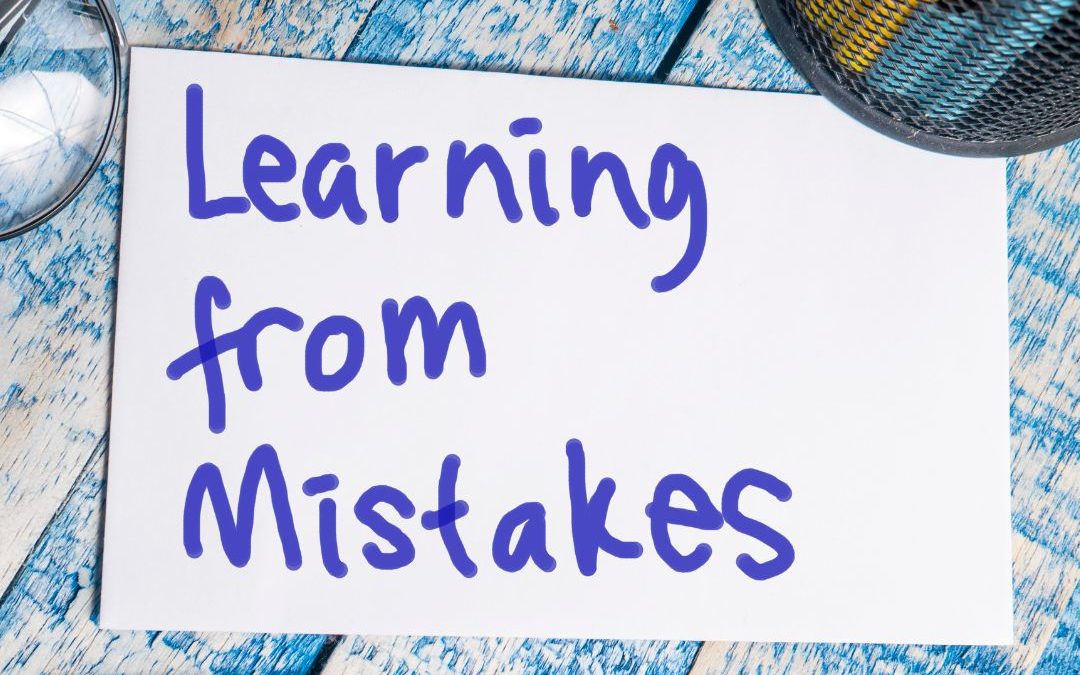
We all make mistakes. It is human nature and a by-product of living a full life. Some mistakes are small and we forget them quickly. Other mistakes are significant and have long lasting effects on our life and perhaps even the lives of others.
Avoiding Mistakes
It is not uncommon to want to avoid making mistakes. In fact, many people do everything they can to prevent mistakes from happening. The reality is that we cannot foresee or predict every possible scenario. As a result, we feel surprised or duped by our ignorance. We feel like imposters who doubt our own competence. Once a mistake happens, we secretly wonder about our instincts, our judgment, and our lack of foresight. Additionally, and more inwardly, we fear the feelings associated with the mistake. These feelings prick the very essence of our basic human needs – acceptance, appreciation, attention, and affection.
Just as change is constant, mistakes are inevitable. These are universal truths.
Recently, I made a pretty public mistake. I sent out the October 2022 newsletter twice. My intent was to delay the publication date from the 15th of the month to the 20th in order to buy myself a few extra days. I did something wrong in my attempt to update the monthly publication date, which made it painfully obvious just how limited my skills are when using my Customer Relations Management (CRM) program. Lesson learned. Gulp. Red face. Waves of embarrassment mentally crashed over me as clients and friends emailed to ask if I knew what happened. The great news is that people read the newsletter and noticed. The lessons I learned…more on that as you read on.
A Helpful Life Skill
Knowing how to overcome a mistake is a helpful life skill. Just as with many of the topics I write about, learning how to move on from a mistake is a learnable and actionable skill. Whether it is in your personal or professional life, embracing your ability to effectively deal with a mistake can be a gamechanger for your confidence, self-image, and interpersonal relationships.
Five Tips to Help You Move On From a Mistake
I’ve included five tips to help you move on from a mistake in healthy and sustainable ways.
Tip 1: Be Your Own Best Friend.
When you’ve made a mistake it is easy to be hard on yourself.
You might even catastrophize the situation and imagine scenarios playing out that are far worse than anything that might happen in actuality.
Stop in this moment and ask yourself what you would say to your best friend if they came to you and shared their mistake with you.
I guarantee you would be far gentler and kinder with your feedback and comments to them.
Treat yourself with the same compassion you extend to your dearest friend. Write down the advice you’d give your bestie and apply it to yourself.
Tip 2: Feelings are Fleeting – Remember the 90-second rule
It is a hardwired survival reflex to believe that when something bad happens or when we make a mistake, we’re going to experience the pain of it for far longer than what happens in actuality. However, according to brain scientist, Dr. Jill Bolte, we experience feelings for a mere 90 seconds as chemicals are flushed through our body and put us on alert (think flight or fight). After the 90 seconds, it is all about our mental conditioning and if we choose to stay in the emotional loop of what we’ve decided to think about and how it re-stimulates a physiological reaction.
Lingering emotions represent our personal inner narrative. They are the mental ink that writes the stories we tell ourselves about the emotions we feel.
Think about an emotion you experience just as you would a wave on the ocean. The wave will rise, crest, and fall. This pattern of experiencing emotions happens many times during your day.
Tip 3: Be Mindful of Your Thoughts.
Given what we know about emotions and the inner narrative we create with the stories we mentally tell ourselves, it is important to be mindful of our thoughts.
When you’ve just lived through a mistake, note your thoughts, especially your negative automatic ones. Write them down and then examine them for evidence of truth.
Look for ways to reframe your thinking as you explore the reality of your situation and reframe based on perspective, time, and allowing the emotional wave to recede.
Tip 4: Take Things One Step at a Time.
When a mistake feels really fresh and painful, it can be difficult to imagine moving beyond it. At a time like this, doing nothing seems less risky (e.g., wanting to hide under a comfy duvet and avoid any human contact for days).
If this sounds appealing, I encourage you to avoid the impulse and basically do the exact opposite of how you’re feeling. If you want to hide in bed all day, go for a walk. If you want to avoid people, call, or text a close friend.
Action precedes motivation. When you take things one step at a time, you will build momentum and as with the 90-second rule, the intensity of the feeling will pass quickly. Even if you think it isn’t possible, you will move on, if you let yourself.
Just take things one step, one hour, and one day at a time.
Tip 5: Create a Game Plan.
If you need to apologize, do so. Make a point of making amends as is needed and appropriate. Don’t rehash the mistake or overdo the apology. Be direct, to the point, and clear about your remorse, and action steps to prevent it from happening again.
This is where creating a game plan can be quite helpful and where I loop back to my November newsletter mistake.
Reflective and Reflexive Thinking
In counselling psychology, we explore the merits of applying both reflective and reflexive practice to learning. These concepts are equally as applicable in supporting the goal of effectively moving on from mistakes too.
When a person reflects, they think about what they learned from a mistake.
For me, I learned that I need to build in more time to prepare my newsletter and imagine that each month will be as full of work as what I experienced in early November. I also learned that I need to ask for help sooner and not trust my CRM skills. I have great support in this area, yet I didn’t leverage it.
The reflexive aspect of this practice involves considering the implications of the learning and how it can impact the broader context as well as second and third order consequences.
By applying both reflective and reflexive thinking about a mistake, we can find strategies to question our own attitudes, thought processing, values, assumptions and habits. Another term for this process is called, Critical Reflective Practice.
To learn more about it, I invite you to watch this 17-minute video by the University of Liverpool Online Centre for Student Success.
“Mistakes are part of the dues one pays for a full life.” – Sophia Loren



